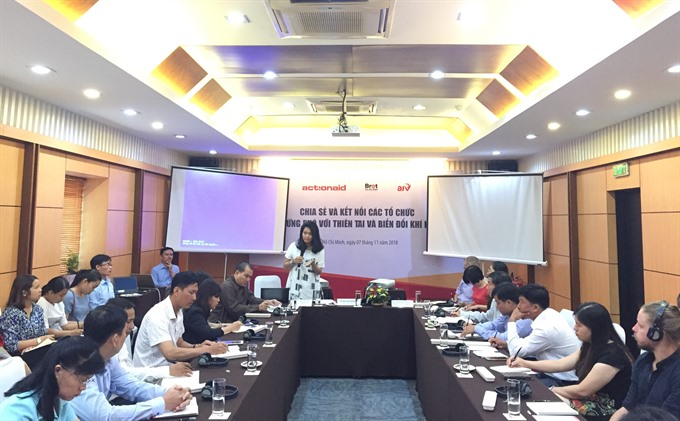 Society
Society

As many as 300 people from 60 households living in disaster- and climate change-affected areas in the Cửu Long (Mekong) Delta are benefiting from an organic vegetable model which is part of a two-year capacity-building project.
 |
| A seminar in HCM City on Wednesday reviews a two-year capacity-building project for locals to respond to natural diasters caused by climate change. — VNS Photo Ngọc Diệp |
HCM CITY — As many as 300 people from 60 households living in disaster- and climate change-affected areas in the Cửu Long (Mekong) Delta are benefiting from an organic vegetable model which is part of a two-year capacity-building project.
A seminar held in HCM City on Wednesday reviewed the 545,800 euro (US$626,580) project, which prepares locals to respond to natural disasters caused by climate change.
From December 2016 to the end of the year, the project was conducted by the Aid for Social Protection Programme Foundation in Việt Nam (AFV) with funds from the Bread for the World (BfdW) and ActionAid International Việt Nam (AAV).
Six localities in Trà Vinh Province’s Trà Vinh City and Sóc Trăng Province’s Kế Sách District are taking part in the project.
Bùi Bá Bình, deputy head of AFV, said the project had improved the life of vulnerable communities, especially women and youth from ethnic minorities.
“Through suitable prevention, mitigation and coordination, it has improved locals’capacities on dealing with climate change’s negative impact,” he said.
Best practices on community-based disaster management and coordination are being replicated at provincial and national levels.
Project coordinator Đặng Thế Nhân said that three parts of the project were being implemented, including coordination of stakeholders in emergency response; growing of organic vegetables in net houses; and participatory data gathering (PDG) applications.
Workshops and mock drills on developing disaster management and coordination are being held at the commune, ward, district and city levels in localities.
Local people’s awareness has improved, with more participation in emergency response activities.
In addition, the role, responsibilities and relationships of stakeholders have been clearly indentified.
Sixty households in Kế Sách District and Trà Vinh City were given training courses, and financial, technical and material support to grow organic vegetables in net houses.
The households have made a profit of 1-2.5 million ($43-107) per month from a 500sq.m net house, and VNĐ800,000 to VNĐ1 million ($34-43) from a 200sq.m net house.
The organic method has resulted in more than 20 per cent in profits compared to traditional cultivation methods.
Organic vegetable cooperatives are expected to be set up in Kế Sách District’s Thới An Hội Commune and Trà Vinh City’s Ward 9.
The PDG app requires a smartphone with a minimum RAM capacity of 1.5 GB.
The app include news, livelihood models, hazard alerts, early warnings, market prices, surveys, user information, and contacts.
Data analysis hubs and names of agencies at all levels in localities are included, while many locals also post news about landslide warnings, urban pollution and diseases.
Lessons
The project needs to develop a plan to create larger, concentrated farmland for households participating in organic vegetable model.
“So far, no disaster management and coordination in emergency response exists at the village level,” Nhân said.
He said it was difficult to change local residents’ cultivation habits without use of chemical fertilizers or pesticides.
“Meetings, training, and technical advice are still needed,” he said.
It also takes time to select households that meet the project criteria and comply with the organic model’s technical processes.
At least 12 months are needed for products certified as organic and accepted by the market.
In addition, difficulties remain in linking with the consumption market, with low productivity and loss of income in some households.
Meanwhile, the PDG app requires internet connection. Most locals have smartphones but have a lower RAM capacity.
“That limits the number of households,” Nhân said.
Vũ Bá Quản, head of Kế Sách District’s Sub-department of Agriculture and Rural Development, said the increase in locals’ income and effective community-based disaster management were the most significant successes of the project. — VNS




